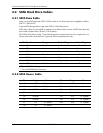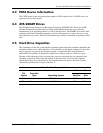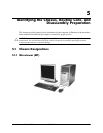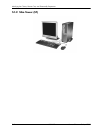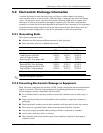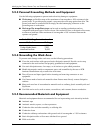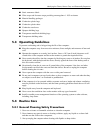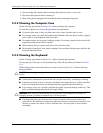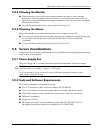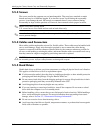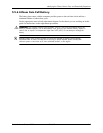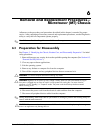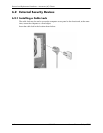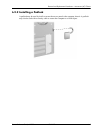
5–6 433611-001 Service Reference Guide, dx7300
Identifying the Chassis, Routine Care, and Disassembly Preparation
4. Always unplug the computer before cleaning the keyboard, mouse, or air vents.
5. Disconnect the keyboard before cleaning it.
6. Wear safety glasses equipped with side shields when cleaning the keyboard.
5.4.2 Cleaning the Computer Case
Follow all safety precautions in Section 5.4.1 before cleaning the computer.
To clean the computer case, follow the procedures described below:
■ To remove light stains or dirt, use plain water with a clean, lint-free cloth or swab.
■ For stronger stains, use a mild dishwashing liquid diluted with water. Rinse well by wiping it
with a cloth or swab dampened with clear water.
■ For stubborn stains, use isopropyl (rubbing) alcohol. No rinsing is needed as the alcohol will
evaporate quickly and not leave a residue.
■ After cleaning, always wipe the unit with a clean, lint-free cloth.
■ Occasionally clean the air vents on the computer. Lint and other foreign matter can block the
vents and limit the airflow.
5.4.3 Cleaning the Keyboard
Follow all safety precautions in Section 5.4.1 before cleaning the keyboard.
To clean the tops of the keys or the keyboard body, follow the procedures described in Section
5.4.2.
When cleaning debris from under the keys, review all rules in Section 5.4.1 before following
these procedures:
Ä
CAUTION: Use safety glasses equipped with side shields before attempting to clean debris from under
the keys.
■ Visible debris underneath or between the keys may be removed by vacuuming or shaking.
■ Canned, pressurized air may be used to clean debris from under the keys. Caution should be
used as too much air pressure can dislodge lubricants applied under the wide keys.
■ If you remove a key, use a specially designed key puller to prevent damage to the keys. This
tool is available through many electronic supply outlets.
Ä
CAUTION: Never remove a wide leveled key (like the space bar) from the keyboard. If these keys are
improperly removed or installed, the keyboard may not function properly.
■ Cleaning under a key may be done with a swab moistened with isopropyl alcohol and
squeezed out. Be careful not to wipe away lubricants necessary for proper key functions. Use
tweezers to remove any fibers or dirt in confined areas. Allow the parts to air dry before
reassembly.



